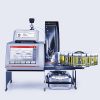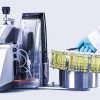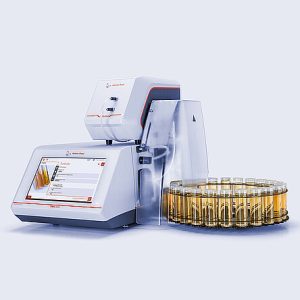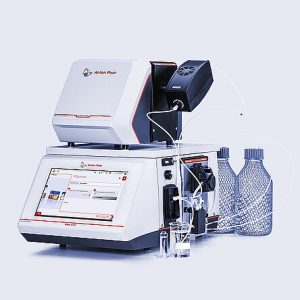Multiparameter Measurement System:
Lubricant Measurement Systems
Key features
Time-saving multiparameter measurements for lubricant samples
Lubricant Measurement Systems streamline quality control processes by providing multiple essential parameters in a single measurement. The user-friendly interface makes it easy to manage quality control measurements for various lubricants, including rapid sample changes and parameter adjustments. Simultaneous measurement of viscosity, density, and refractive index is complemented by automatic calculation of viscosity index, carbon-type composition of insulating oils (ASTM D2140), and carbon distribution of petroleum oils (ASTM D3238) – all within a single setup. Users can choose between the SVM viscometer or the DMA density meter as the primary instrument.
Fast return on investment
The small measurement cells of the Lubricant Measurement Systems require very little sample (minimum of 12.5 mL) and solvent, resulting in minimum disposal costs. Temperature control using Peltier technology consumes less energy, meaning lower cost per sample. The high degree of automation provided by an Xsample 530 sample changer increases productivity, reduces the potential for human error, and frees up the operator to perform other tasks. Fully automated measurements can also be performed overnight and during weekends.
Compliance is key in lubricant analysis
The Lubricant Measurement Systems comply with all international standards and product specifications. Viscosity and density are measured according to ASTM D7042 and D4052, while the refractive index measurement complies with ASTM D1218. Density value temperature and pressure corrections are based on ASTM D1250. The system also calculates the viscosity-gravity constant (VCG) per ASTM D2501, and estimates mean relative molecular mass in accordance with ASTM D2502 – enabling determination of carbon-type composition (ASTM D2140) and carbon distribution (ASTM D3238), respectively.
Utmost flexibility matched with sample variety
The broad measuring range of the Lubricant Measurement Systems enables measurements of a wide variety of oils and lubricants – including mineral, engine, process, insulating, cosmetic, and medicinal grade white oils – without the need for various capillaries, baths, or instruments. This flexibility ensures no time is wasted when measuring samples with unknown viscosity, as no time-consuming capillary selection is required.
Easy handling and low maintenance with clever instrument setup
The Lubricant Measurement Systems are designed for ease of use – from installation to daily operation. The intuitive software shows you all the parameters you need, with calculations performed automatically by the integrated PC. Both the measuring cells and the measuring prism of the refractometer are highly robust and accessible without tools, enabling convenient cleaning.








